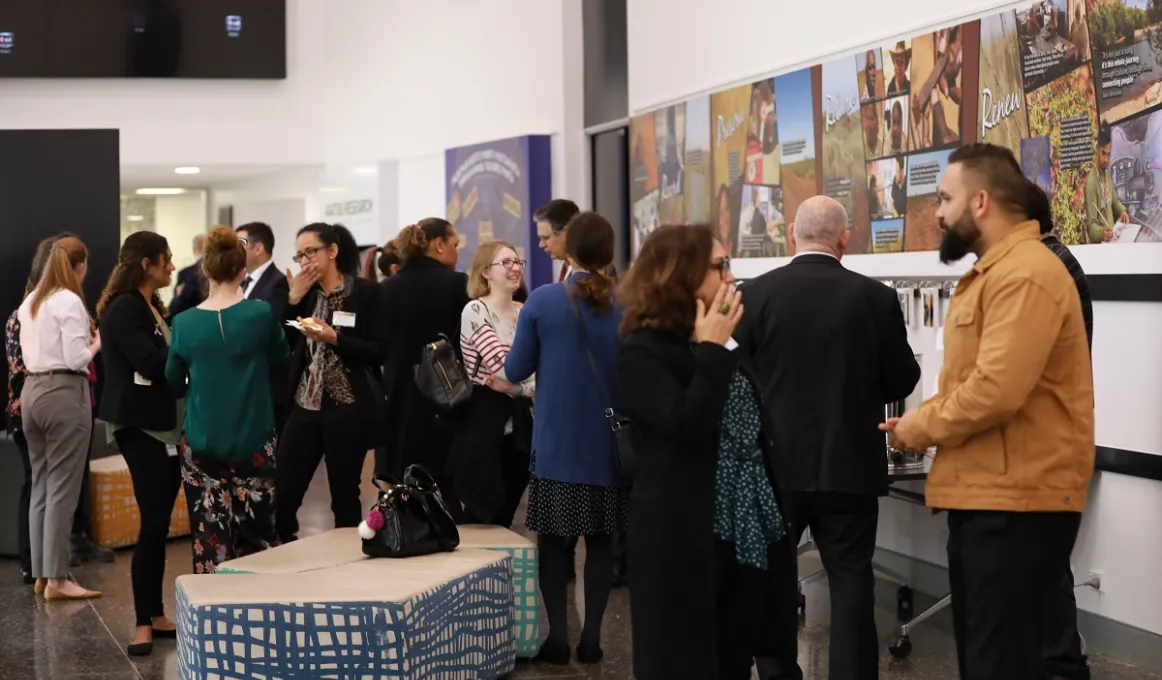Exchanging ideas and sharing experiences at the Indigenous Executive-Graduate forum

A recent event at AIATSIS was a chance for Indigenous Senior Executive Service (SES) officers in the Australian Public Service (APS) to provide support for newly recruited Indigenous graduates.
Starting a new job is never easy. There are new work practices to learn, new relationships to build and perhaps new values to adopt.
That’s why support from people who have ‘been there and done that’ is critical.
That was the idea behind a recent ‘meet and greet’ event held at the Australian Institute of Aboriginal and Torres Strait Islander Studies. It was a chance for Indigenous Senior Executive Service (SES) officers in the Australian Public Service (APS) to provide support for newly recruited Indigenous graduates*.
Tom Calma AO, Co-Sponsor of the Indigenous SES Network, said there are around 25 Indigenous SES officers in the APS at the moment who are a major resource for the government and APS in supporting Indigenous graduates.
‘They can ensure that Aboriginal and Torres Strait Islander people, both in the recruitment process and in the retention process and of course, their progression throughout the ranks of the public service, is done in a way that will benefit Aboriginal and Torres Strait Islander people,’ Tom said.
Coming with a range of skills and from around Australia, graduates arrive in the APS with high hopes, varied expectations but always with a desire to make a difference.
Scott Wilson is a Gooniyandi and Miriuwung/Gajerrong man from Broome. Before becoming a graduate entry employee of the Department of the Prime Minister and Cabinet, he worked for the Fortescue Metals Group.
‘My overall goal is to have an impact in terms of social change and understand how the policies are created and how we can impact policies to best affect the people, which is the reason why we are here,’ Scott said.
In talking about the ‘meet and greet’, Scott said having first-hand experience with a lot of Aboriginal leaders in the SES was empowering, the graduate program was a great training space for his career pathway.
‘In terms of progress, I’ve always seen myself getting into politics so this graduate program in itself is a way of understanding policy at the ground level so I can best utilise that information into my political aspirations,’ Scott said.
‘So after this, I would like to take a lot of the experiences, a lot of information, a lot of the knowledge that I’ve gained in the graduate program at PM&C and take that on board into my political career later on in my life.’
Tom Calma can see the long term advantage of increasing Indigenous participation in the APS and in particular, the SES.
‘As Aboriginal and Torres Strait Islander employees, this [public sector] is more than a vocation for us,’ Tom said.
‘It’s an opportunity for us to contribute to our own advancement and wellbeing and those of our relatives, so we have a vested interest in this, which I would argue, is a bit more than most other people have within the public service.’
Find out more
*Graduates are employees recruited directly from university or other training programs who have shown the ability and skills suitable for leadership in the APS.
For more information, see APS Graduate Recruitment and The SES.